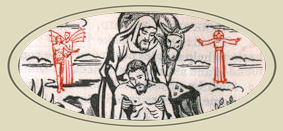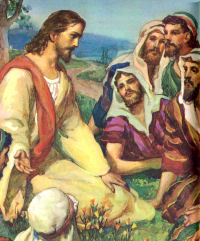» Enjoy our Liturgical Seasons series of e-books!
Jesus said to his disciples: "Do not be afraid any longer, little flock, for your Father is pleased to give you the kingdom. Sell your belongings and give alms. Provide money bags for yourselves that do not wear out, an inexhaustible treasure in heaven that no thief can reach nor moth destroy. For where your treasure is, there also will your heart be."
The feast of St. Sixtus II and Companions and St. Cajetan, which is ordinarily celebrated today, is superseded by the Sunday liturgy.
Click here for commentary on the readings in the Extraordinary Form of the Roman Rite.
Sunday Readings
The first reading is taken from the Book of Wisdom 18:6-9 and refers to the events of the Exodus, in which God showed his mighty power to save his chosen ones from their cruel enemies.
The second reading is from St. Paul to the Hebrews 11:1-2, 8-11 and gives a definition of the virtue of faith, and an example of true faith as it can be seen to be active in Abraham and Sarah.
The Gospel is from St. Luke 12:32-48 and in a few vivid and expressive similes, our Lord tells the disciples and through them, all his followers, how they should conduct their lives on earth so that they would always be found in God's friendship when their call to judgment comes. In answer to a question put to him by Peter, our Lord says that more will be expected of those who have received greater gifts from God than of those who received lesser gifts.
This teaching of our Lord should make us all sit up and take serious notice. He has taken us into his household. He has made us his "little flock." We are invited guests in his home, his Church, rather than mere servants. He warns us today that we must always be busy about our vocation, about the reason why he invited us into his home. If we grasped clearly what that call of Christ means, what our Christian vocation is, we would hardly need today's warning. We are Christians, we are members of his Church, for our own eternal good. God, through Christ's Incarnation, has put us on the road to heaven. He is ever helping us on the way. Could we be so blind to our own welfare that we would risk losing the eternal life that God has in store for us, and for which He went to the extreme lengths of love? In our saner moments we would give an emphatic no to this question. Yet, we must look the real facts of life in the face. There are many Christians who are destined for heaven but who, in their folly, have left the only road which leads there, and are now traveling in the opposite direction.
Some of us here present may be among these foolish ones. We may have let this world get such a grip on us that we have no time or thought for the world that is to come. For such foolish people, and indeed for all of us, today's warning is that our call to judgment will come on each one of us like a thief in the night, at a moment when we least expect it. This need not be a sudden death. Of every thousand who die after long illnesses in our hospitals, there rarely is one who knows and admits he is about to die, so actually all deaths are sudden, that is, unexpected.
However the unexpected death, which we are sure to get, need not worry the ordinary good Christian. It is the unprepared, the unprovided death which must cause us anxiety. It need not, if, when it comes, it finds us living in God's grace, living the ordinary Christian life, doing our daily tasks but doing them as part of our duty to God. We have to take an interest in the affairs of this world, but the interest must never exclude our eternal interest. Instead it can and must help us toward the one real interest that man has in this life, that is, to earn his eternal life.
Take a serious look at your way of living today. Is your behavior in the home, in your place of work, in your recreation, in your relations with God—prayers and church attendance—and with your neighbor, it is such that you would change nothing in it, if you were told by God that you were to die tonight? If it is, thank God for it and keep on going; you are on the right road. If it is not, don't wait for God to tell you when or where you will die; he will not tell you. Put things right today, and then you need not worry when your call to judgment comes. Death will be graduation day for the good Christian—not examination day.
— Excerpted from The Sunday Readings Cycle C, Fr. Kevin O' Sullivan, O.F.M.
 Commentary on the Readings for the Twelfth Sunday after Pentecost
Commentary on the Readings for the Twelfth Sunday after Pentecost
"A Samaritan (seeing the robbers' victim) was moved with compassion, bound up his wounds, pouring on oil and wine, and took care of him. And Jesus said, 'Go and do thou also in like manner'" (Gospel).
St. Bede suggests that this victim is Adam and the human race robbed by Satan (pictured at left). Jesus, our Divine Rescuer (pictured at right), comes to pour "wine and oil" into our "wounds": the "life"-giving Wine of His Precious Blood (PostCommunion), the "cheerful...oil" of all His Sacraments (Communion Verse).
Otherwise, having left the "Jerusalem" of Divine Life, how could we "run without stumbling" (Prayer) lifeless into the Dead Sea next to "Jericho"? "We are not sufficient of ourselves..our sufficiency is from God." Without Jesus the Ten Commandments would be dead "letters upon stones" (Epistle)
What Christ does for us, we "in like manner" are to do unto others, friend and foe. "Samaritan-charity" is Christ's own teaching.
Excerpted from My Sunday Missal, Confraternity of the Precious Blood






